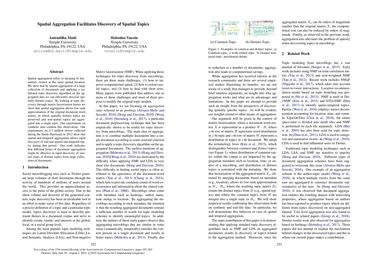Spatial Aggregation Facilitates Discovery of Spatial Topics
Spatial aggregation refers to merging of documents created at the same spatial location. We show that by spatial aggregation of a large collection of documents and applying a traditional topic discovery algorithm on the aggregated data we can efficiently discover spatially distinct topics. By looking at topic discovery through matrix factorization lenses we show that spatial aggregation allows low rank approximation of the original document-word matrix, in which spatially distinct topics are preserved and non-spatial topics are aggregated into a single topic. Our experiments on synthetic data confirm this observation. Our experiments on 4.7 million tweets collected during the Sandy Hurricane in 2012 show that spatial and temporal aggregation allows rapid discovery of relevant spatial and temporal topics during that period. Our work indicates that different forms of document aggregation might be effective in rapid discovery of various types of distinct topics from large collections of documents.
PDF Abstract